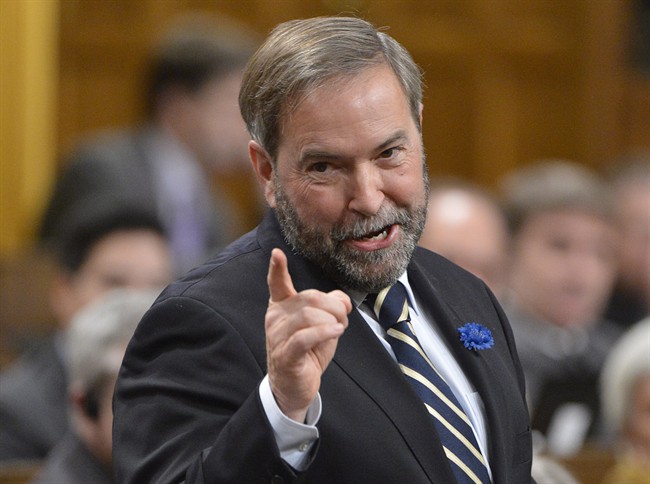OTTAWA – Tom Mulcair is insisting that the NDP’s expensive campaign promises are still affordable, even though a precipitous plunge in the price of oil has blown a huge hole in federal revenues.

However, the NDP leader won’t yet say precisely where he’d get the billions necessary to pay for his promised national daycare program, or to finance his vow to restore the annual six per cent increase in health care transfer payments to the provinces.
READ MORE: Mulcair seen as better leader, but Trudeau favoured to win: poll
In an interview Friday, Mulcair made it clear he has no confidence in the Harper government‘s promise to balance the 2015-16 budget in the face of plummeting oil prices.
There will be no way to tell if that’s true before the next federal election, scheduled for October, he noted.
“They’ll be able to put up the numbers that they want to put up and it will never have to be measured against the real world,” Mulcair told The Canadian Press.
Mulcair said he’s not worried he might have to renege on some campaign pledges if the books turn out worse than expected – a scenario that has caused grief for some incoming governments in the past.
And he promised the NDP’s eventual platform will be fully costed by the time the election campaign, scheduled for October, gets underway.
Mulcair pointed to two measures an NDP government would implement to help finance its platform: reversing corporate tax cuts and scrapping the government’s income-splitting scheme.
READ MORE: Mulcair shakes up NDP team as election looms
Other than that, Mulcair said an NDP government would not raise taxes.
“Absolutely not,” he said. “Categorical on that.”
Scrapping income splitting would save the government more than $2 billion a year.
How much revenue the NDP hopes to reap by hiking corporate taxes is not clear, since Mulcair has not said how big a hike he’s contemplating. Moreover, some economists argue that raising corporate taxes would not actually generate much revenue and would impede economic growth.
“We’re not setting the amount (of the increase) now but we know that Canadian corporations have to start paying their fair share,” Mulcair said.
The NDP leader used to say the party would increase the 15 per cent federal corporate tax rate to bring Canada closer to the average of OECD countries. However, Canada’s corporate tax rate is already higher than the OECD average.
More recently, Mulcair has said the NDP would bring the rate closer to the average of G7 countries, which would mean a potential hike of up to 4.5 percentage points.
Erin Weir, a labour economist running for the NDP in Saskatchewan, estimates that each percentage point increase would generate about $1.5 billion in revenue each year.
However, Laval University economist Stephen Gordon argues that such estimates don’t take into account the proven behavioural consequence of hiking corporate taxes: corporations simply find ways to shift income to other countries to avoid paying the tax.
The G7 includes the United States and Japan, both of which impose corporate tax rates of close to 40 per cent and are able to do so almost with impunity, simply because their economies are so massive, Gordon said.
By contrast, he continued, a punitive tax regime in Canada’s much smaller economy would have negative repercussions, discouraging corporate investment and stunting economic growth
Hiking corporate taxes is “pretty much the worst choice you can make” to raise revenue, Gordon said.
Mulcair’s solution? Provide the resources to allow the Canada Revenue Agency to crack down on corporate tax avoidance.
“We’re just going to become as smart as the people who set up those (tax avoidance) schemes for them,” Mulcair said.
In its fiscal update last November, when oil was selling at about US$80 per barrel, the Harper government estimated the price plunge would drain some $2.5 billion every year between 2015 to 2019. Since then, the price of oil has dropped below US$46.
As a result, Finance Minister Joe Oliver is delaying the next budget until at least April, and doubts persist that the government can both balance the books and implement plans for income splitting and other family tax benefits.
The revenue drain also puts opposition parties in a bind as they try to fashion platforms for the coming election. That’s particularly true of the NDP, which began last fall to spell out some big-ticket platform measures well ahead of the election.
Among other things, Mulcair has promised that the NDP will create one million new day care spaces that can be accessed for no more than $15 per day – at a cost of $5 billion annually to the federal treasury, once fully implemented over eight years.
WATCH: NDP proposes national $15-a-day child care program
He has also promised to restore the annual six per cent increase in health care transfers to the provinces, which could cost upwards of $30 billion over nine years.
Former parliamentary budget officer Kevin Page, who denounced the Harper government’s fiscal management in a speech Friday to the NDP caucus, said later that there is actually plenty of fiscal room for opposition parties to make major spending promises.
But that would entail changing the way federal budgets are crafted, making a distinction between money spent on programs and money invested in capital projects, such as infrastructure projects or military procurement – as is done in other countries.
The latter involves investments in things that last for years and help spur economic growth, Page argued. Consequently, he said there’s no reason why the government shouldn’t run a capital deficit, especially in times like these.
“It’s totally natural to run a deficit when the economy is performing below potential,” he said.
“We have an investment problem. You cannot get growth going forward without some investment.”

Comments